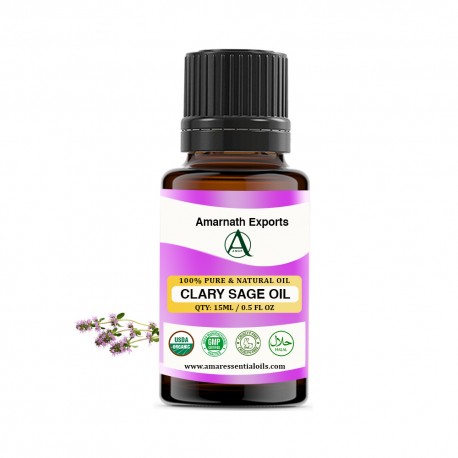No products
Product successfully added to your shopping cart
There are 0 items in your cart. There is 1 item in your cart.
Clary Sage Oil
New
Clary sage, known scientifically as Salvia sclarea, is native to the northern Mediterranean Basin. Its use dates back to ancient times, where it was revered for its medicinal properties and aromatic qualities. The plant has been historically used in various cultures for its ability to promote relaxation and improve overall well-being.
51 Items
More info
Botanical Name - Salvia Sclarea
Plant Family - Lamiaceae
Country of Origin - India
Odour Strength - Medium
Appearance - Light Yellow to pale yellow
Odor - Fresh herbaceous, ambery, slightly floral woody and tea like.
Usage - Fragrance Industry, Pharmaceutical Industry, Cosmetic Industry
Main ingredients - Linalool, Linalyl Acetate, Pinene, Myrcene.
Blends well with - Bergamot, Cederwood, Chamomile, Geranium, Jasmine, Lavender, Neroli, Orange, Rosewood, Sandalwood, Ylang Ylang.
Buy Clary Sage Oil | Salvia Sclarea
Clary Sage, a biennial or perennial herb, can reach heights of up to six feet. Renowned for its soothing qualities and skin benefits, Clary Sage contains linalyl acetate as its primary chemical compound, belonging to the esters group. This attribute positions it as among the most calming, comforting, and harmonizing essential oils. During the Middle Ages, the Clary Sage plant was commonly employed to alleviate skin discomfort. Inhaling its aroma fosters a sense of relaxation, facilitating a tranquil night's rest. Clary sage oil is extracted through steam distillation of the flowering tops and leaves of the clary sage plant. It contains numerous compounds, including linalool, linalyl acetate, and sclareol, which contribute to its therapeutic properties and distinct aroma.
Clary Sage Oil in Traditional Medicine
In traditional medicine, clary sage oil has been used to address various health concerns, including menstrual cramps, digestive issues, and respiratory ailments. Its analgesic and antispasmodic properties make it a valuable remedy for managing pain and discomfort.
Modern Medicine
In modern medicine, clary sage oil is used in pharmaceuticals, cosmetics, and perfumery. Its natural composition and therapeutic benefits make it a sought-after ingredient in various products designed to promote health and well-being.
Properties
Clary sage presents a distinctly pale yellow hue. Its taste is notably sweet and pleasant. The oil exhibits a watery viscosity. Among the primary chemical constituents of Clary sage are linalool, linalyl acetate, caryophyllene, α-terpineol, geraniol, Neryl acetate, Sclareol, and germacrene D. Its origins trace back to South Africa.
Uses
-
Clary Sage Oil boasts a myriad of aromatherapeutic properties, serving as a beacon of tranquility and relaxation. Its soothing aroma permeates the air, promoting a sense of calmness and emotional balance. Whether diffused or diluted in a carrier oil for massage, Clary Sage Oil is renowned for alleviating stress and uplifting the spirits.
-
Embraced by skincare aficionados worldwide, Clary Sage Oil offers a plethora of benefits for the skin. Rich in antioxidants and antimicrobial compounds, it helps combat blemishes, soothe irritation, and promote a radiant complexion. Incorporating Clary Sage Oil into skincare formulations infuses them with nature's rejuvenating touch.
- A beacon of hope for those navigating hormonal imbalances, Clary Sage Oil emerges as a potent ally. Its estrogen-mimicking properties aid in regulating hormonal fluctuations, offering relief from menstrual discomfort and menopausal symptoms. From cramps to hot flashes, Clary Sage Oil extends a nurturing embrace to those in need.
-
In the realm of respiratory wellness, Clary Sage Oil shines as a beacon of relief. Its antispasmodic and expectorant qualities provide respite from coughs, congestion, and respiratory distress. Inhalation of Clary Sage Oil vapor clears the airways and fosters easy breathing, promoting respiratory resilience year-round.
Reviews
No customer comments for the moment.









